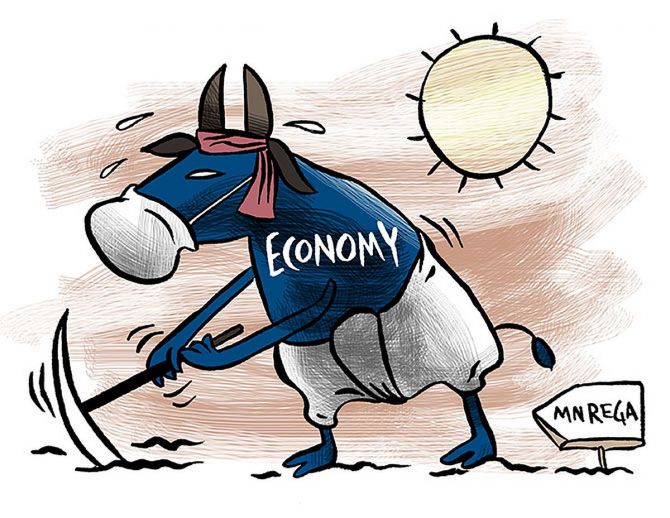Almost 63 per cent of the increased allocation of around Rs 1.01 trillion has been spent in the first five months of 2020-21.

Funds allocated for the Mahatma Gandhi National Rural Employment Generation Scheme (MGNREGS) are fast drying up even as the project continues to attract a sizeable chunk of the rural workforce.
Almost 63 per cent of the increased allocation of around Rs 1.01 trillion has been spent in the first five months of 2020-21.
With more than six months to go for the fiscal year to close, experts said if 100 days’ of employment per year, as mandated by law, was to be provided, this expanded allocation too might be insufficient and exhausted by December or January.
The MGNREGA (Mahatma Gandhi National Rural Employment Generation Act) website shows that as of September 8, about Rs 63,511.95 crore has been spent on the scheme while the amount available (which includes the states’ share) is around Rs 63,176.43 crore, leaving a shortfall of approximately Rs 335.52 crore.
In some big states such as Chhattisgarh, the negative balance (the difference between the funds available and expenditure) is almost Rs 3,200 crore, according to the website, while in states such as Bihar it is around Rs 224.24 crore.
In Odisha, the balance of Rs 70 crore is due to be paid.
Though the negative balance changes quickly as funds are cleared almost daily, the trend does point towards a slowdown in release.
The Central government in its 2020-21 Budget had allocated around Rs 61,500 crore for the scheme.
This was almost 13.3 per cent lower than the revised estimate of 2019-20.
However, with demand for MGNREGS works surging during the lockdown as migrant labourers returned to their villages, the Central government enhanced the allocation by Rs 40,000 crore.
This made the 2020-21 allocation the highest ever in the scheme’s history.
Of this, around Rs 16,000 crore pertained to the previous year’s liabilities, leaving around Rs 86,000 crore for fresh expenditure this year.
“The government should immediately release the enhanced allocation of Rs 40,000 crore, or else the payment will start getting delayed,” said Rajendran Narayanan, assistant professor at the Azim Premji University, Bengaluru.
He said if at least 100 days’ employment was to be provided, more funds would be required.
So far, around 58 million households have worked under the scheme in just the first five months, while the average full-year number in the last five years is 52-53 million.
This is seen against the fact that civil society activists are saying around 15.5 million people who have demanded work haven’t got any.
So far, on average around 34 days of work has been provided in the first five months, while it has been 48-50 days in the past few years.
Meanwhile, the data shows that work demand under the scheme has shown a steady decline since July as casual labourers got engaged in farming activities, where wages are higher and also migrants returned to their workplaces in cities after the lockdown was lifted.
Till September 10 around 11.8 million households have demanded work.
That is 46 per cent less than in August and the lowest since April.
More, the preliminary data shows this demand was less than in September last year, when 14.1 million households sought work under the scheme.












 © 2025
© 2025